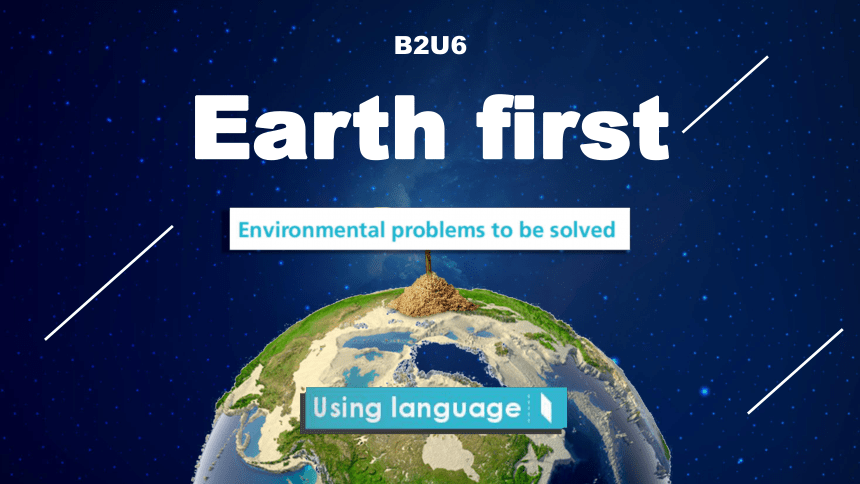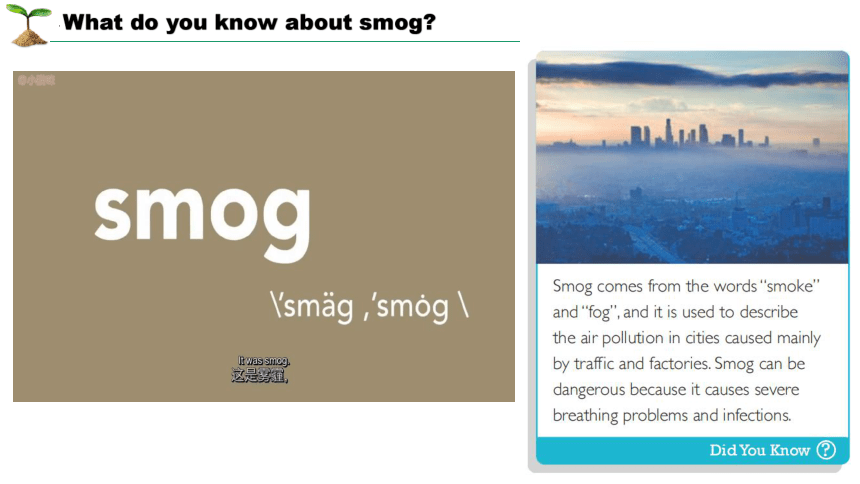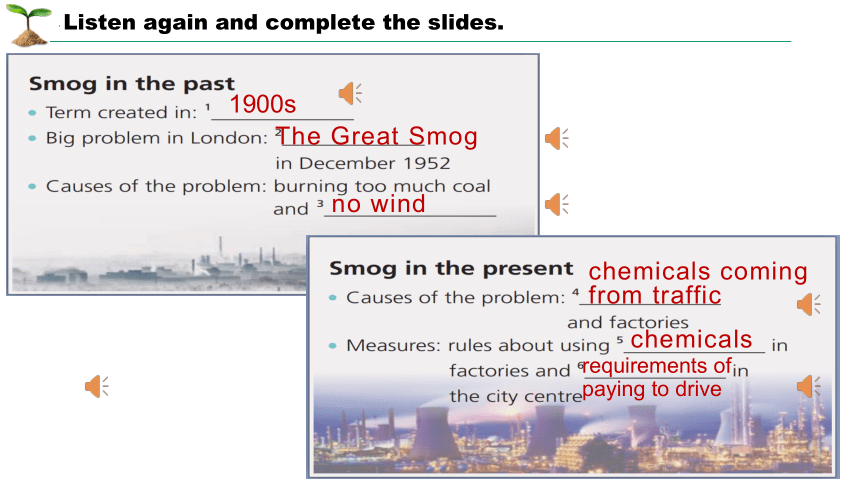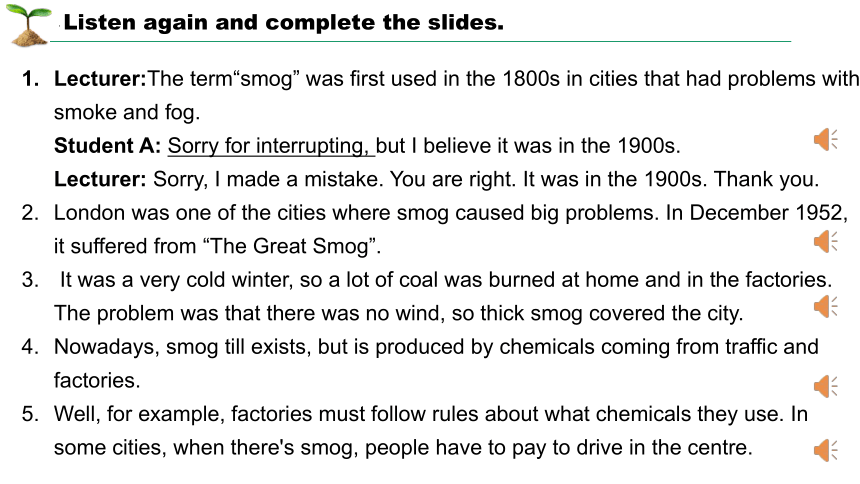外研版(2019)必修第二册Unit 6 Earth first Using language Listening and Speaking 课件(共15张PPT,内镶嵌视频和音频)
文档属性
| 名称 | 外研版(2019)必修第二册Unit 6 Earth first Using language Listening and Speaking 课件(共15张PPT,内镶嵌视频和音频) |  | |
| 格式 | pptx | ||
| 文件大小 | 60.5MB | ||
| 资源类型 | 教案 | ||
| 版本资源 | 外研版(2019) | ||
| 科目 | 英语 | ||
| 更新时间 | 2024-05-21 12:16:41 | ||
图片预览







文档简介
(共15张PPT)
Earth first
B2U6
What environmental problem is it
What do you know about smog
Listen to the lecture and choose the topics that are covered.
Listen again and complete the slides.
1900s
requirements of
paying to drive
The Great Smog
no wind
chemicals
chemicals coming from traffic
Listen again and complete the slides.
Lecturer:The term“smog” was first used in the 1800s in cities that had problems with smoke and fog.
Student A: Sorry for interrupting, but I believe it was in the 1900s.
Lecturer: Sorry, I made a mistake. You are right. It was in the 1900s. Thank you.
London was one of the cities where smog caused big problems. In December 1952, it suffered from “The Great Smog”.
It was a very cold winter, so a lot of coal was burned at home and in the factories. The problem was that there was no wind, so thick smog covered the city.
Nowadays, smog till exists, but is produced by chemicals coming from traffic and factories.
Well, for example, factories must follow rules about what chemicals they use. In some cities, when there's smog, people have to pay to drive in the centre.
Lecturer: Good evening, everyone, and thank you for coming to today's talk. I'm Dr Brown and I'm going to talk about air pollution in cities - what we all know as “smog”. Please feel free to stop me if you have any questions. So, first of all, a bit of history. The term“smog” was first used in the 1800s in cities that had problems with smoke and fog.
Student A: Sorry for interrupting, but I believe it was in the 1900s.
Lecturer: Sorry, I made a mistake. You are right. It was in the 1900s. Thank you. London was one of the cities where smog caused big problems. In December 1952, it suffered from “The Great Smog”. It was a very cold winter, so a lot of coal was burned at home and in the factories. The problem was that there was no wind, so thick smog covered the city. Nowadays…
Student B: Excuse me, but can I just ask - did the smog cause any death
Lecturer: I'm afraid so. According to research, about 4,000 people are known to have died as a result of the smog, but that number could much higher. It was terrible! Nowadays, smog till exists, but is produced by chemicals coming from traffic and factories. However, governments are taking measures to reduce smog as much as possible. Now, let's look at what smog does to our health...
Student A: If I could just stop you again... Can you give us examples of these measures
Lecturer: Well, for example, factories must follow rules about what chemicals they use. In some cities, when there's smog, people have to pay to drive in the centre. Now, let's move on to the impact of smog on our health…
Now talk about what the students say to interrupt the lecturer politely. Listen again if necessary
Useful expressions:
1. Sorry for interrupting, but…
2. Excuse me, but can I just ask...
3. If I could…
4. Can you…
Group the following sentences into the right section.
Please feel free to stop me if you have any questions.
Sorry to interrupt, but ...
I'm afraid...
Excuse me, but can I just ask...
Is it OK if I jump in for a second
Well,...
Could I just stop you again to check ...
Sorry. I've made a mistake.
Do you mind if I ask another question
You're right, ...
polite interruption
sincere correction
Group the following sentences into the right section.
polite interruption
sincere correction
Please feel free to stop me if you have any questions.
Sorry. I've made a mistake.
You're right, ...
I'm afraid...
Well,...
Sorry to interrupt, but ...
Excuse me, but can I just ask...
Could I just stop you again to check ...
Do you mind if I ask another question
Sorry, but I was wondering whether ...
Is it OK if I jump in for a second
The classification of household waste aims to help people separate different types of waste. This is important because these different types of waste can be disposed of or recycled appropriately and effectively
Household waste can be roughly divided into:
* food waste
* non-recyclable waste
* recyclable waste, including paper, glass, plastic and use batteries
China plans to introduce household waste classification and sorting in the first batch of cities by 2020. Only Beijing, Shanghai, Tianjin and Chongqing are included in the first batch.
The target recycling rate in these cities has been set at 55% by 2020.
Student A
Tell Student B about recycling using the information below. Be prepared to be corrected by Student B.
Work in pairs and talk about recycling.
Used batteries are usually regarded as non-recyclable waste and should be disposed of separately.
The first batch of cities to introduce household waste classification and sorting includes Beijing, Shanghai, Tianjin, Chongqing and all capitals of provinces and autonomous regions.
The target recycling rate in these cities has been set at 35% by 2020.
Listen to Student A talking about recycling. Interrupt politely to correct him / her using the following information:
Work in pairs and talk about recycling.
Student B
Possible version
1
A: Hey, xxx. Do you know anything about recycling It’s been a heated topic for a long time.
B: Yeah. One of it is the classification of household waste.
A: It is said that household waste can be roughly divided into three sorts, food waste, non-recyclable waste, and recyclable waste, including paper, glass, plastic and used batteries.
B: Sorry, could I stop you a little bit Used batteries are usually regarded as non-recyclable waste and should be disposed of separately.
A: Sorry, I’ve made a mistake. Besides that, China has made a plan for some metropolis to solve this environmental problem. Only Beijing, Shanghai, Tianjin and Chongqing are included in the first batch of cities by 2020.
B: Sorry, but I was wondering whether capitals of provinces and autonomous regions are also included.
A: Yeah, you are right. They all count. And do we need to recycle all of the waste I think the target recycling rate in these cities has been set at 55% by 2020.
B: Sorry to interrupt, but the rate should be 35% by 2020.
Possible version1.
Possible version2.
A: Hey, xxx. Do you know anything about recycling It’s been a heated topic for a long time.
B: Yeah. One of it is the classification of household waste.
A: Yeah, it aims to help people separate different types of waste. But why do we need to do so
B: I think it’s because if not, it would be hard for workers to dispose of or recycle different types of waste appropriately and effectively.
A: Oh, I get it. It is said that household waste can be roughly divided into three sorts, food waste, non-recyclable waste, and recyclable waste, including paper, glass, plastic and used batteries.
B: Seriously I do think you are wrong. Used batteries are usually regarded as non-recyclable waste and should be disposed of separately.
A: Sorry, I’ve made a mistake. Besides that, China has made a plan for some metropolis to solve this environmental problem. Only Beijing, Shanghai, Tianjin and Chongqing are included in the first batch of cities by 2020.
B: Sorry, but I was wondering whether capitals of provinces and autonomous regions are also included.
A: Yeah, you are right. They all count. And do we need to recycle all of the waste I think the target recycling rate in these cities has been set at 55% by 2020.
B: Sorry to interrupt, but the rate should be 35% by 2020.
A: Well, Jesus Christ. You almost made me insane …
Earth first
B2U6
Earth first
B2U6
What environmental problem is it
What do you know about smog
Listen to the lecture and choose the topics that are covered.
Listen again and complete the slides.
1900s
requirements of
paying to drive
The Great Smog
no wind
chemicals
chemicals coming from traffic
Listen again and complete the slides.
Lecturer:The term“smog” was first used in the 1800s in cities that had problems with smoke and fog.
Student A: Sorry for interrupting, but I believe it was in the 1900s.
Lecturer: Sorry, I made a mistake. You are right. It was in the 1900s. Thank you.
London was one of the cities where smog caused big problems. In December 1952, it suffered from “The Great Smog”.
It was a very cold winter, so a lot of coal was burned at home and in the factories. The problem was that there was no wind, so thick smog covered the city.
Nowadays, smog till exists, but is produced by chemicals coming from traffic and factories.
Well, for example, factories must follow rules about what chemicals they use. In some cities, when there's smog, people have to pay to drive in the centre.
Lecturer: Good evening, everyone, and thank you for coming to today's talk. I'm Dr Brown and I'm going to talk about air pollution in cities - what we all know as “smog”. Please feel free to stop me if you have any questions. So, first of all, a bit of history. The term“smog” was first used in the 1800s in cities that had problems with smoke and fog.
Student A: Sorry for interrupting, but I believe it was in the 1900s.
Lecturer: Sorry, I made a mistake. You are right. It was in the 1900s. Thank you. London was one of the cities where smog caused big problems. In December 1952, it suffered from “The Great Smog”. It was a very cold winter, so a lot of coal was burned at home and in the factories. The problem was that there was no wind, so thick smog covered the city. Nowadays…
Student B: Excuse me, but can I just ask - did the smog cause any death
Lecturer: I'm afraid so. According to research, about 4,000 people are known to have died as a result of the smog, but that number could much higher. It was terrible! Nowadays, smog till exists, but is produced by chemicals coming from traffic and factories. However, governments are taking measures to reduce smog as much as possible. Now, let's look at what smog does to our health...
Student A: If I could just stop you again... Can you give us examples of these measures
Lecturer: Well, for example, factories must follow rules about what chemicals they use. In some cities, when there's smog, people have to pay to drive in the centre. Now, let's move on to the impact of smog on our health…
Now talk about what the students say to interrupt the lecturer politely. Listen again if necessary
Useful expressions:
1. Sorry for interrupting, but…
2. Excuse me, but can I just ask...
3. If I could…
4. Can you…
Group the following sentences into the right section.
Please feel free to stop me if you have any questions.
Sorry to interrupt, but ...
I'm afraid...
Excuse me, but can I just ask...
Is it OK if I jump in for a second
Well,...
Could I just stop you again to check ...
Sorry. I've made a mistake.
Do you mind if I ask another question
You're right, ...
polite interruption
sincere correction
Group the following sentences into the right section.
polite interruption
sincere correction
Please feel free to stop me if you have any questions.
Sorry. I've made a mistake.
You're right, ...
I'm afraid...
Well,...
Sorry to interrupt, but ...
Excuse me, but can I just ask...
Could I just stop you again to check ...
Do you mind if I ask another question
Sorry, but I was wondering whether ...
Is it OK if I jump in for a second
The classification of household waste aims to help people separate different types of waste. This is important because these different types of waste can be disposed of or recycled appropriately and effectively
Household waste can be roughly divided into:
* food waste
* non-recyclable waste
* recyclable waste, including paper, glass, plastic and use batteries
China plans to introduce household waste classification and sorting in the first batch of cities by 2020. Only Beijing, Shanghai, Tianjin and Chongqing are included in the first batch.
The target recycling rate in these cities has been set at 55% by 2020.
Student A
Tell Student B about recycling using the information below. Be prepared to be corrected by Student B.
Work in pairs and talk about recycling.
Used batteries are usually regarded as non-recyclable waste and should be disposed of separately.
The first batch of cities to introduce household waste classification and sorting includes Beijing, Shanghai, Tianjin, Chongqing and all capitals of provinces and autonomous regions.
The target recycling rate in these cities has been set at 35% by 2020.
Listen to Student A talking about recycling. Interrupt politely to correct him / her using the following information:
Work in pairs and talk about recycling.
Student B
Possible version
1
A: Hey, xxx. Do you know anything about recycling It’s been a heated topic for a long time.
B: Yeah. One of it is the classification of household waste.
A: It is said that household waste can be roughly divided into three sorts, food waste, non-recyclable waste, and recyclable waste, including paper, glass, plastic and used batteries.
B: Sorry, could I stop you a little bit Used batteries are usually regarded as non-recyclable waste and should be disposed of separately.
A: Sorry, I’ve made a mistake. Besides that, China has made a plan for some metropolis to solve this environmental problem. Only Beijing, Shanghai, Tianjin and Chongqing are included in the first batch of cities by 2020.
B: Sorry, but I was wondering whether capitals of provinces and autonomous regions are also included.
A: Yeah, you are right. They all count. And do we need to recycle all of the waste I think the target recycling rate in these cities has been set at 55% by 2020.
B: Sorry to interrupt, but the rate should be 35% by 2020.
Possible version1.
Possible version2.
A: Hey, xxx. Do you know anything about recycling It’s been a heated topic for a long time.
B: Yeah. One of it is the classification of household waste.
A: Yeah, it aims to help people separate different types of waste. But why do we need to do so
B: I think it’s because if not, it would be hard for workers to dispose of or recycle different types of waste appropriately and effectively.
A: Oh, I get it. It is said that household waste can be roughly divided into three sorts, food waste, non-recyclable waste, and recyclable waste, including paper, glass, plastic and used batteries.
B: Seriously I do think you are wrong. Used batteries are usually regarded as non-recyclable waste and should be disposed of separately.
A: Sorry, I’ve made a mistake. Besides that, China has made a plan for some metropolis to solve this environmental problem. Only Beijing, Shanghai, Tianjin and Chongqing are included in the first batch of cities by 2020.
B: Sorry, but I was wondering whether capitals of provinces and autonomous regions are also included.
A: Yeah, you are right. They all count. And do we need to recycle all of the waste I think the target recycling rate in these cities has been set at 55% by 2020.
B: Sorry to interrupt, but the rate should be 35% by 2020.
A: Well, Jesus Christ. You almost made me insane …
Earth first
B2U6
